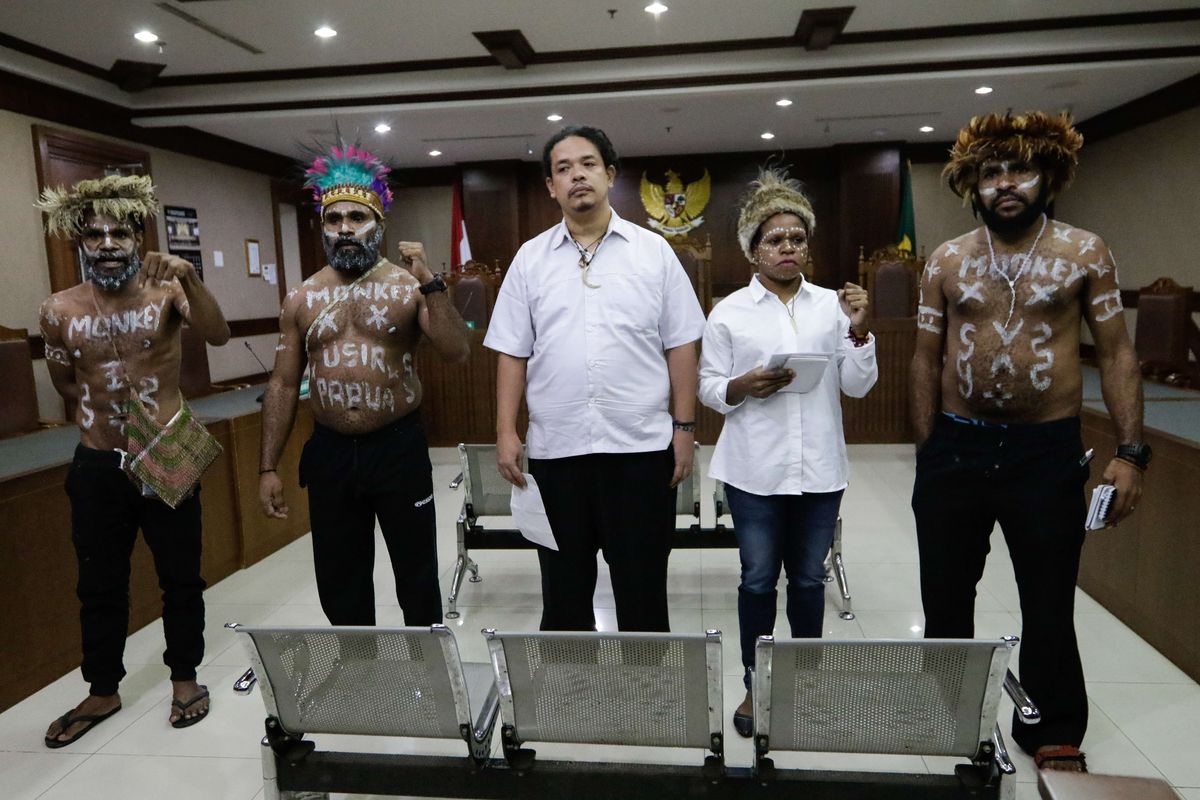Ex-Prisoner Takes to Twitter to Expose Extortion, Drugs in Indonesian Prison

JAKARTA, KOMPAS.com – A recently released inmate of a prison in Central Jakarta has introduced Indonesia's Twitter-verse to a totally new kind of micro-blogging content: stories of life behind bars peppered with details of extortion, drug trafficking, and sharing two toilets with over 400 others.
Indonesian human rights activist Surya Anta Ginting and five other Papuan political activists were found guilty for committing acts of treason following a rally for the liberation of Papua in front of the presidential palace in Jakarta in August 2019. The other activists are Ariana Eleopere, Dano Anes Tabuni, Charles Kossay, Ambrosius Mulait, and Issay Wenda.
Surya served his nine-month sentence in the Salemba Penitentiary in Central Jakarta. He was released from prison in May 2020 and began posting stories via his Twitter account @SuryaAnta on Sunday, July 12.
On his first day in prison, he said, an inmate extorted money from him and his friend for one million rupiahs ($70) and three million rupiahs ($207), respectively.
"Finally, 500,000 rupiahs ($34.5) were extorted from each of us five when they learned we were activists and not sons of influential people," Surya wrote in his Twitter account.
Also read: Poor Public Compliance with Health Protocols Fuels Jakarta’s High Covid-19 Cases
Crowded prison
Surya said he and his four colleagues were placed with about 420 other prisoners in a hall meant for new inmates for a month. He uploaded a photo that showed prisoners sleeping in cramped conditions in a hall.
"Prisoners sleep like preserved fish laid out in a grid pattern. We had to sleep on our side," Surya said.
The facilities were inadequate as the entire population of the hall had to share only two toilets and a single television unit. The prisoners collected water to quench their thirst.
"There is only one TV set in the room [for the new inmates]. If anyone dares to touch the dial, people will immediately make noise. These plastic bottles are meant to hold water for drinking. But when we drink the water, it feels sticky on our throat. It causes sore throat," Surya tweeted.
He added that fights between inmates in the holding room were common, and they were often triggered by the inane and unnecessary.
“Due to overcrowding, prisoners fought over sweet potatoes, someone wearing another person's sandals, spilled coffee, and stolen side dish,” he wrote.
Also read: Refugees in Indonesia Say UNHCR Jakarta Office Reneging on Food Aid Promise
The pharmacy
Surya also exposed the trade in methamphetamine, locally known as syabu, which was carried out openly by the inmates inside the prison.
“From the second floor, the inmates promote their products to the new prisoners while shouting: 'Syabu, syabu, syabu who wants syabu for Saturday night?'”
After one month of staying in the orientation hall, Surya and his colleagues were moved to Room 18 in J Block following pressure from other activists.
However, many prisoners must live in alleys due to a lack of money and support. He said social class differentiates treatment in prison.
"Many prisoners and inmates sleep in the hallway because they don't have money to pay the 'ticket' to enter the room and pay weekly room fees," Surya said.
The cell he was in was apparently a "pharmacy" room or the room where transactions for methamphetamine took place, he said. The room, he added, was also one of the nicest rooms in the past.
"The warden knew about this. I wonder why we were placed in such a room."
Life in prison does not mean the basic needs will be borne by the state, Surya said, noting that rice, viand, and water were rationed in small amounts. They had to buy and cook food for themselves.
"We also buy water for ourselves. We buy the gallon plastic bottle. If there is trouble with electricity, we have to pay the expenses. Other prisoners are required to pay the room fee and pay a weekly fee. We don’t pay because the prison is concerned about the public pressure," Surya said.
Also read: Indonesia Imposes Biodiesel Program to Fight Smear Campaign Against Palm Oil in EU
To survive in prison, the inmates take on odd jobs from pickpocketing to repairing electronic devices. The prison has its own micro-economy of sorts - providing cellphone services, money transfers, selling food, selling perfume, and illegal drug trade.
To provide the best rehab
“We are currently tracing the information given,” Corrections Directorate General Spokesperson Rika Aprianti told Kompas.com on Monday, July 13.
Rika said the Directorate General of Correctional Facility is committed to providing the best rehabilitation services for prisoners and detainees.
The Corrections Directorate General, she added, has also taken necessary actions against extortion and drug trafficking in the prison.
“We have taken strict actions against prisoners who are involved in extortion and drug trafficking violations.”
Rika also said that overcrowding remains one of the main problems in the penitentiary. In Salemba prison, she added, there are 3,249 inmates, while it should only be for 1,500 people. Meanwhile, the number of guards to monitor the inmates comprises 21 to 23 people in a team.
“Indeed, overcrowding is one of the problems that must be resolved as it causes many issues,” she said.
(Writer: Ardito Ramadhan | Editor: Fabian Januarius Kuwado, Bayu Galih)
Simak breaking news dan berita pilihan kami langsung di ponselmu. Pilih saluran andalanmu akses berita Kompas.com WhatsApp Channel : https://www.whatsapp.com/channel/0029VaFPbedBPzjZrk13HO3D. Pastikan kamu sudah install aplikasi WhatsApp ya.






























